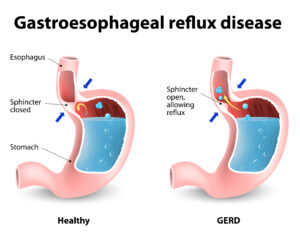
menu

Posted in Uncategorized | May 10, 2022

Have you had a recurring sore throat? Having a hoarse voice or sore throat that goes away after a few days is standard for most people.
However, if your sore throat and hoarseness linger, it can signal a more concerning illness in some instances. Keep reading to find out when hoarseness and a sore throat signify something more serious and how to treat them.

Hoarseness refers to experiencing changes in the quality or pitch of your voice. Your voice can sound husky, weak, or raspy.
A hoarse voice can also be strained, breathy, or scratchy. When you develop hoarseness, it can be due to overusing or misusing your voice, having a cold, the flu, coughing excessively, allergies, or smoking.
But while rare, your raspy voice can also indicate something more severe.
Sore throats are common and often not something worth worrying about. You may have two to three sore throats every year.
Most sore throats disappear after a week without the need for treatment. It might be painful to eat, swallow, or even talk when you have a sore throat.
Your throat may also feel irritated and scratchy. The leading causes of sore throats are having a cold, the flu, smoking, and allergies.
Even though most sore throats are not severe, they could also signify a significant underlying health issue.
Some of the possible causes of your sore throat and hoarseness include:
A tumor developing on one side of your throat can cause pain on that side and a sore throat. These are indications of throat cancer.
Hoarseness, fatigue, a persistent cough with traces of blood, and chest pain are among the first signs of lung cancer linked to smoking. If you have any of these symptoms, see your primary care physician.
Early diagnosis improves the chances of successful treatment.
Laryngitis is the irritation and swelling of your voice box due to a bacterial or viral infection. At the same time, a dry cough, dehydration, and smoking can also cause the condition.
When your laryngitis results from an infection, experiencing heavy post-nasal drip and swollen lymph nodes on one side of the neck can lead to a sore throat on the same side. Other symptoms of laryngitis are hoarseness, throat pain, and losing your voice.
Sleep apnea is a sleep disorder that causes you to briefly stop breathing while sleeping and suddenly wake up because of a lack of oxygen. You may abruptly awaken hundreds of times throughout the night.
People with sleep apnea tend to sleep with their mouths open, causing the throat to become sore and scratchy. If you suffer from hoarseness and a consistent sore throat, talk to your ENT specialist about your concerns.

Gastroesophageal reflux disease or GERD is a chronic condition caused by weakened muscles located at the end of your esophagus. As a result, your stomach acid comes back up through the esophagus to the larynx and throat.
When your stomach acid comes back up, it leads to symptoms like chest pain, heartburn, and sometimes a sore throat on one side due to how your sleep. Even more problematically, when you expose your vocal cords and throat to the acid, they become inflamed and swollen, causing hoarseness.
An underactive thyroid (more commonly known as hypothyroidism) happens when the thyroid gland in your neck produces too little of the thyroid hormones. An underproduction of hormones slows down your body’s metabolism.
It also leads to symptoms such as a change in your voice, slow heart rate, fatigue, and constantly feeling cold. A common cause of an underactive thyroid is Hashimoto’s Thyroiditis.
The autoimmune disease interferes with the normal functioning of your thyroid. With Hashimoto’s Thyroiditis, you may notice symptoms like an enlarged thyroid, a feeling of fullness in the throat, and a sore throat. None of the signs or symptoms of the autoimmune condition are unique to it.
Strep throat is an infection caused by the Streptococcus bacteria, resulting in a very painful or sore throat. People with strep throat may have red and swollen tonsils, swollen lymph nodes, and other symptoms.

Typically, home treatments such as gargling with warm salt water and drinking hot fluids can reduce the discomfort and swelling. Sore throats tend to improve with non-prescription medications like anti-inflammatory drugs, throat lozenges, or decongestants.
However, you should visit an expert ENT specialist at Specialty Care Institute if your sore throat has lasted for over a week and doesn’t get better with home remedies or over-the-counter medicines. It’s also best to go to an ENT specialist if you notice your symptoms are gradually worsening.
They will also take your medical history and request a physical exam before treating you. Sore throat treatment will depend on the particular cause. For example, if you have strep throat, your doctor may prescribe antibiotics such as amoxicillin or penicillin.

See an otolaryngologist if your hoarseness doesn’t go away on its own within a week or two. It’s especially recommended if there’s no apparent reason for your hoarse voice, like having the flu or a cold.
When you seek professional help, your ENT specialist will likely begin by asking about your symptoms. They might also want to inspect your throat, mouth, and neck.
You may undergo tests to diagnose your hoarseness, like blood work, a throat culture, a CT scan, and X-rays of the neck. The proper treatment for your hoarse voice will depend on your diagnosis.
For instance, if tests reveal a tumor, your ENT specialist will discuss the best treatment options like surgery.

Does your hoarseness or sore throat keep recurring? Are your symptoms getting worse even after trying home remedies and over-the-counter medications?
The otolaryngologists at Specialty Care Institute can help. Our ENT specialists have the knowledge and expertise to deal with your problem.
Schedule an appointment at Speciality Care Institute in Arlington Heights, Barrington, Hoffman Estates, or Elgin, IL, today to find a long-term solution for your hoarseness or sore throat.